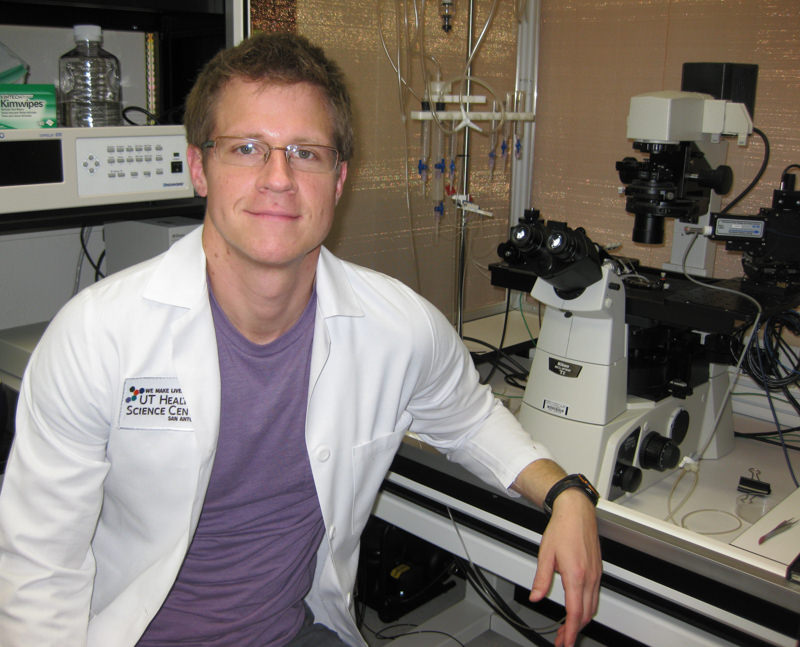Dr. Dustin Green Works on Pain Research At Johns Hopkins

Dr. Dustin Green, a graduate student in the Department of Physiology, has just accepted a postdoctoral position at Johns Hopkins
University.
Dr. Green will be working in Dr. Xinzhong Dong‘s lab where he will continue to work with pain research.
“His lab offers some great tools that complement what I’ve already learned and it will expand my career as a neuroscientist,” Dr. Green said. “Being in that lab and being part of the Solomon H. Snyder Department of Neuroscience allows me to be surrounded by world leaders in neuroscience research.”
Dr. Green is currently working on research regarding the mechanism of burn pain in Dr. Kenneth Hargreaves lab.
“This is a devastating clinical problem,” Dr. Hargreaves said. “Patients with burn injuries will endure pain that last for decades after their injury and opiates provide very little effectiveness for patients with burn injury.”
Dr. Hargreaves explained that Dr. Green’s research has led to the discovery of completely new mechanisms for burn pain.
“His very first paper on this topic he showed that a novel drug reversed burn pain by 98 percent and doesn’t involve the use of addictive compounds like opiates at all,” Dr. Hargreaves said. “By doing basic research on pain mechanisms, he was able to make a discovery that is directing us towards treating us toward burn pain through non addictive drugs by looking at the
source.”
 Dr. Hargreaves believes that pain is a unique area because it encompasses all areas which will allow Green many opportunities for
Dr. Hargreaves believes that pain is a unique area because it encompasses all areas which will allow Green many opportunities for
collaborations.
“There is no Department of Pain at any university, instead it’s bringing in psychiatrists, physiologists, pharmacologists, molecular biologists, anatomists, pathologists together to focus on this common problem,” Dr. Hargreaves said. “Pain is the number one symptom that brings patients into healthcare and is the unifying symptom that unites all of the disciplines at a university.”
One of the reasons Dr. Green was attracted to Dr. Dong’s lab was because of his collaborations with pharmaceutical companies.
“Studying chronic pain is a human disease so it’s translational in the sense that the discoveries you make can immediately be translated into pharmacological therapies,” Dr. Green said. “Dr. Dong’s relationship with pharmaceutical companies helps him put many of the drugs he is working on into the clinic which is a fascinating and rewarding aspect of research.”
Dr. Green also explained that he is excited to be at Johns Hopkins University because of the proximity to major conferences.

“Conferences allow me to network with people it’s also an avenue to show off your work,” he said. “Johns Hopkins is a well-connected campus and it has a great neuroscience program with well-funded faculty and that’s important to me because getting funding, collaborating and publishing in high impact journals is part of my capital.”
In addition to conferences, he is looking forward to making new friends, meeting new people, and being in a new environment.
“I’m excited to move to a place with seasons,” he said. “I’ve never experienced snow before so that will be an adventure.”
 This article was written by Charlotte Anthony, marketing specialist at the Graduate School of Biomedical Sciences at UT Health San Antonio. This article is part of the “Meet The Researcher” series which showcases researchers at the Graduate School of Biomedical Sciences at University of Texas Health Science Center San Antonio.
This article was written by Charlotte Anthony, marketing specialist at the Graduate School of Biomedical Sciences at UT Health San Antonio. This article is part of the “Meet The Researcher” series which showcases researchers at the Graduate School of Biomedical Sciences at University of Texas Health Science Center San Antonio.
